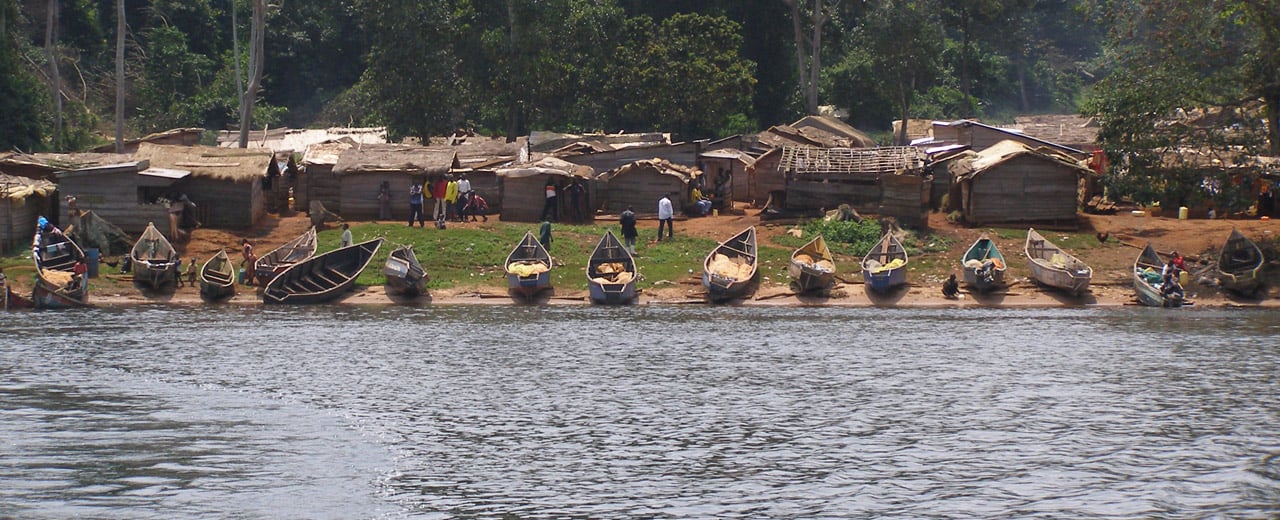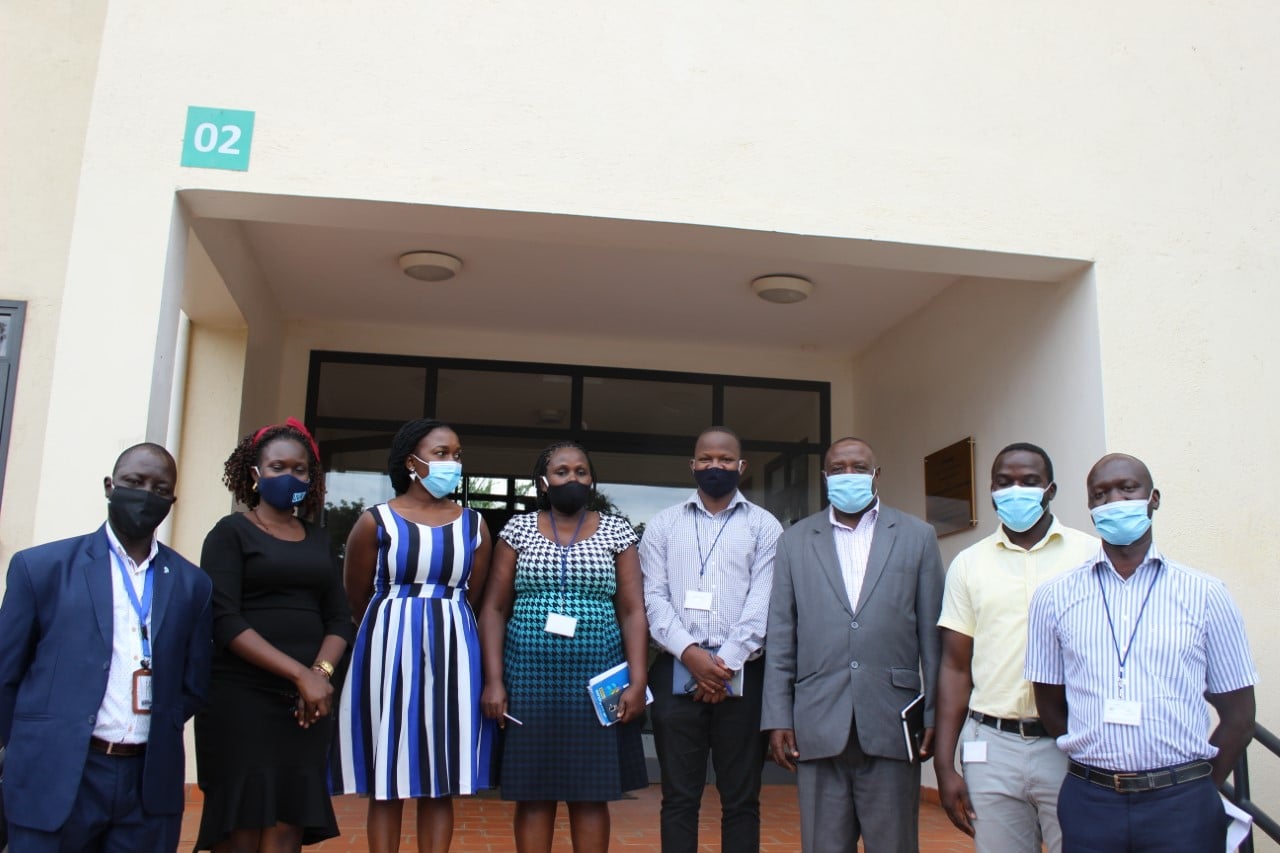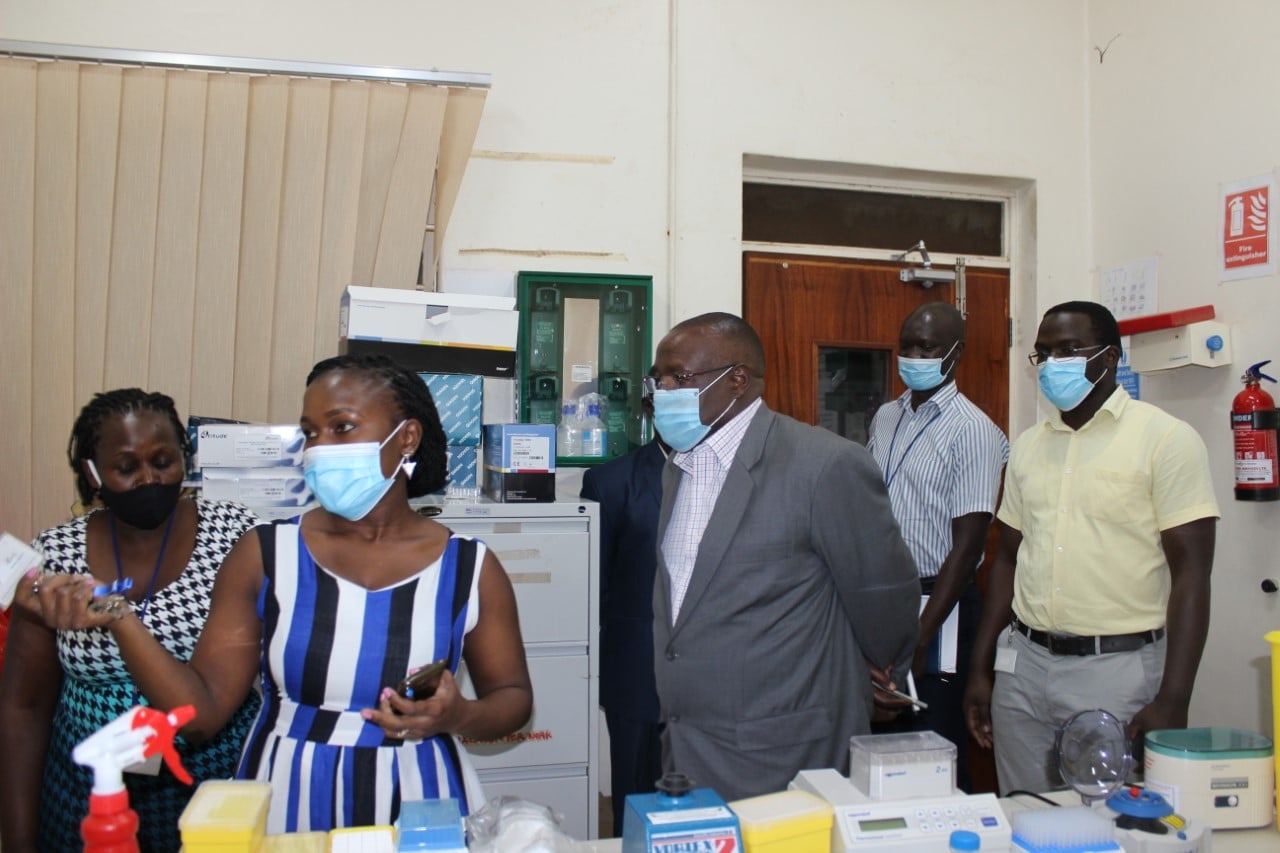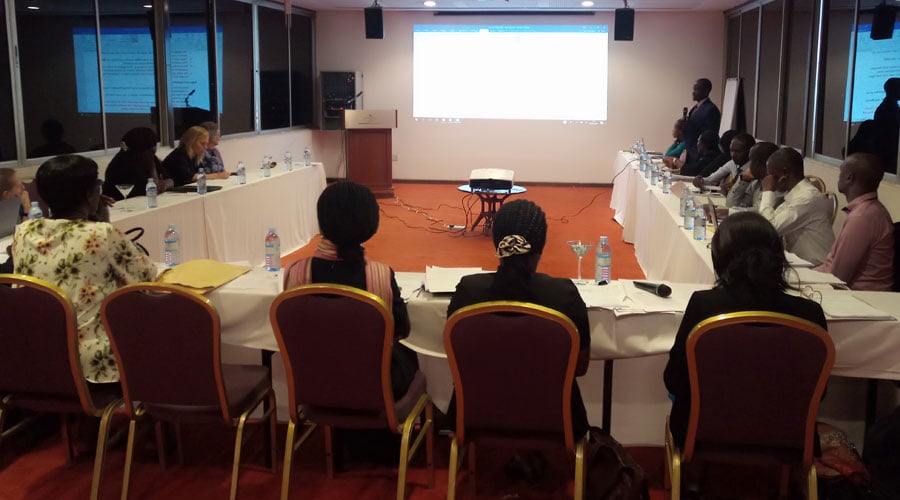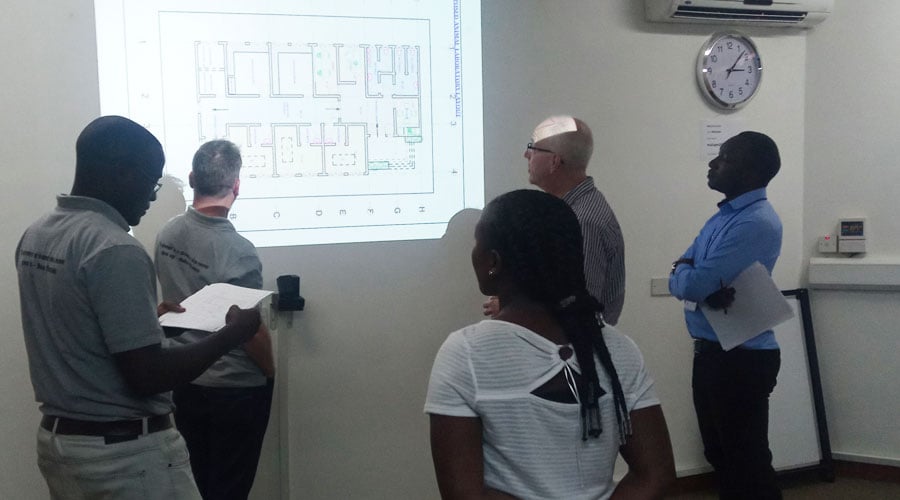Our work builds on CHI-S model development in the Netherlands (NL)8 and Wellcome-supported stakeholder engagement in Uganda. We aim to establish controlled human infection studies for Schistosoma mansoni (CHI-S) in Uganda, to accelerate schistosomiasis vaccine development for endemic settings.
Schistosomiasis is second to malaria as a parasitic cause of morbidity: 230 million people are infected, >90% in sub-Saharan Africa. Humans host three main species: Schistosoma mansoni (Sm), japonicum (Sj) and haematobium (Sh).
- Adapt CHI-S for Ugandan communities with minimal and intense prior schistosome exposure
- Test SchistoShield preliminary efficacy using challenge studies in NL and Uganda
- Compare responses to CHI-S and SchistoShield between NL and Uganda
- Investigate participant and wider-community understandings of CHI studies in the context of CHI-S
- Establish sustainable CHI-S capacity for Uganda
Schistosomiasis has been prioritised for urgent vaccine development. We hope to contribute to this goal using a controlled human infection model with Schistosoma mansoni (CHI-S). Building on the CHI-S developed in the Netherlands and stakeholder engagement in Uganda, we plan to implement the CHI-S in an endemic population.
Our work builds on CHI-S model development in the Netherlands (NL)8 and Wellcome-supported stakeholder engagement in Uganda. We aim to establish controlled human infection studies for Schistosoma mansoni (CHI-S) in Uganda, to accelerate schistosomiasis vaccine development for endemic settings.
Principal investigator
- Professor Alison Elliott
Co-principal investigator(s)
- Prof. dr. Meta Roestenberg
- Professor Afzal Siddiqui
Co-investigators, (MRC/UVRI and LSHTM) Uganda Research Unit
- Dr Anne Wajja
- Prof Janet Seeley
- Dr Moses Egesa
- Dr Stephen Cose
- Ms Emmanuella Dricuru
- Dr Richard Sanya
- Dr Agnes Ssali
- Dr Andrew Abaasa
Coinvestigators, Vector Control Division, Ministry of Health, Uganda (VCD)
- Dr Edridah Tukahebwa
- Dr Narcis Kabatereine
- Mr Moses Adriko
Co-investigators, Leiden University Medical Centre (LUMC), The Netherlands
- Dr J.P. Koopman
- Ms M. Casacuberta
- Prof. Dr M. Yazdanbakhsh
Co-investigators, London School of Hygiene & Tropical Medicine
- Dr Emily Webb
Community engagement
For successful understanding and implementation of Controlled human infection studies, many stakeholders ought to be involved from the local communities, ethicists, regulators to members of parliament. This will increase awareness, develop informed consent processes and inform how to adhere to trial procedures (such as avoiding natural infection among volunteers).
Infrastructural development
To maintain the life cycle of S. mansoni, the causative agent of intestinal schistosomiasis, an animal facility is needed and a snail lab is required to produce the challenge material – S. mansoni cercariae. This also involves technical training of local staff to maintain the animal facility and to produce the challenge material.
Safety and dose finding
CHI studies in their nature are invasive and like all trials, safety of volunteers is paramount. To ensure the safety of volunteers, the dose of the challenge materials is escalated with oversight of the DSMB. Based on the safety data from the Leiden University Medical Center Controlled Human Schistosomiasis Infection, CHI-S is safe among naïve volunteers. A risk assessment was performed to evaluate technical considerations for shipping the parasite strain, the intermediate host, ecological implications, natural infection of volunteers, and risks associated with the human challenge (symptoms).
Vaccine trial
Controlled human infection studies provide a means to test promising vaccine candidates such as the advanced preclinical candidate Smp80 that is has been extensively studied for more than a decade in non-human primates and tested in different formulations (adjuvants). In addition, CHI studies are relatively cheap and swift compared to Phase II trials.
Correlates of protection (immunological, metabolic and transcriptional)
Using controlled human infection studies, correlates of protection can be identified. These correlates are then used as surrogate endpoints for Phase II clinical trials.
Studentship
Developing capacity of researchers in endemic areas to carry out controlled human infection studies is a necessity. Doctoral studentships will address this.
- Bilharzia and Worm Control Programme, Vector Control Division, Ministry of Health, Republic of Uganda
- Ministry of Health, Republic of Uganda
- MRC/UVRI & LSHTM Uganda Research Unit
- Leiden University Medical Center Controlled Human Schistosomiasis Infection (LUMC CoHSI)
- Wellcome Trust Human Infection Studies
- HIC-Vac - This is an international network for human infection challenge (HIC) studies to accelerate the development of vaccines
- Considerations on the principles of development and manufacturing qualities of challenge agents for use in human infection models. This document was prepared by hVivo and supported by Wellcome and HIV-Vac to help address the lack of guidance for preparing challenge agents where GMP cannot be applied
Texas Tech University Health Sciences Center - Vaccine development from animal models to clinical trials
- Cavaleri M, Kaslow D, Boateng E, Chen WH, Chiu C, Choy RKM, Correa-Oliveira R, Durbin A, Egesa M, Gibani M, Kapulu M, Katindi M, Olotu A, Pongsuwan P, Simuyandi M, Speder B, Talaat KR, Weller C, Wills B, Baay M, Balasingam S, Olesen OF, Neels P. Fourth Controlled Human Infection Model (CHIM) meeting, CHIM regulatory issues, May 24, 2023. Biologicals. 2024 Feb 10:101745. Epub ahead of print. PMID: 38341355.
- Kapulu M, Manda-Taylor L, Balasingam S, Means G, Ayiro Malungu M, Bejon P, Chi PC, Chiu C, Church EC, Correa-Oliveira R, Day N, Durbin A, Egesa M, Emerson C, Jambo K, Mathur R, Metzger W, Mumba N, Nazziwa W, Olotu A, Rodgers J, Sinyiza F, Talaat K, Kamerling I, Weller C, Baay M, Neels P. Fourth Controlled Human Infection Model (CHIM) meeting - CHIMs in endemic countries, May 22-23, 2023. Biologicals. 2024 Feb 12:101747. Epub ahead of print. PMID: 38350825.
- Abaasa A, Egesa M, Driciru E, Koopman JPR, Kiyemba R, Sanya RE, Nassuuna J, Ssali A, Kimbugwe G, Wajja A, van Dam GJ, Corstjens PLAM, Cose S, Seeley J, Kamuya D, Webb EL, Yazdanbakhshs M, Kaleebu P, Siddiqui AA, Kabatereine N, Tukahebwa E, Roestenberg M, Elliott AM. Establishing a Single-Sex Controlled Human Schistosoma mansoni Infection Model for Uganda: Protocol for Safety and Dose-Finding Trial Immunotherapy Advances, 20 Jul 2023, 3(1):ltad010
- Egesa M, Kiberu D, Sanya RE, Alabi A, Sonnet F, Koopman JPR, Baluku JB, Oguttu DW, Driciru E, Odongo M, Walusimbi B, Elliott AM, Nkurunungi G. Uganda Schistosomiasis Symposium 2023: understanding morbidity drivers and developing controlled human infection models for vaccine research. Trends in Parasitology. Published online April 7th 2023.
- Egesa M, Ssali A, Tumwesige E, Kizza M, Driciru E, Luboga F, Roestenberg M, Seeley J, Elliott AM. Ethical and practical considerations arising from community consultation on implementing controlled human infection studies using Schistosoma mansoni in Uganda. Glob Bioeth. 2022 Jul 4;33(1):78-102.
- Alabi A, Hussain M, Hoogerwerf MA, Mengome CN, Egesa M, Driciru E, Wammes LJ, Kruize YCM, Sartono E, Adegnika AA, Kremsner PG, Yazdanbakhsh M, Agnandji ST. Establishing a controlled hookworm human infection (CHHI) model for Africa: A report from the stakeholders meeting held in Lambaréné, Gabon, November 10-11, 2019. Arch Public Health. 2021 Jul 5;79(1):120.
- Driciru E, Koopman JPR, Cose S, Siddiqui AA, Yazdanbakhsh M, Elliott AM, Roestenberg M. Immunological Considerations for Schistosoma Vaccine Development: Transitioning to Endemic Settings. Front Immunol. 2021 Mar 4;12:635985.
- Koopman JP, Egesa M, Wajja A, Adriko M, Nassuuna J, Nkurunungi G, Driciru E, van Willigen G, Cose S, Yazdanbakhsh M, Kaleebu P, Kabatereine N, Tukahebwa E, Roestenberg M, Elliott AM. Risk assessment for the implementation of controlled human Schistosoma mansoni infection trials in Uganda. AAS Open Res. 2019 Aug 13;2:17.
- Elliott AM, Roestenberg M, Wajja A, Opio C, Angumya F, Adriko M, Egesa M, Gitome S, Mfutso-Bengo J, Bejon P, Kapulu M, Seager Z, Lutalo T, Nazziwa WB, Muwumuza A, Yazdanbakhsh M, Kaleebu P, Kabatereine N, Tukahebwa E. Ethical and scientific considerations on the establishment of a controlled human infection model for schistosomiasis in Uganda: report of a stakeholders' meeting held in Entebbe, Uganda. AAS Open Res. 2018 Aug 6;1:2.
Blogs
Blog – Prevention of infectious diseases
Our collaborators’ works
Prof. dr Meta Roestenberg MD
Professor Human models for vaccine development
Prof Afzal Siddiqui
Grover E. Murray Professor, Texas Tech University Health Sciences Center
Media training & public engagement workshop for human infection studies to Nairobi Kenya, 5th – 7th June 2019. The workshop was being led by the UK government-funded Network HIC-Vac and The KEMRI|Wellcome Trust Research Programme.
Tunisia – Current international good practice in the care and use of laboratory rodents and establishing guidelines for animal ethics committees in Africa.
This training covered two aspects of laboratory animal research: education and training in care and use of laboratory rodents and developing guidelines for animal ethics committees in Africa. This 5-day event was held in March 2019 in Tunisia at the Sidi Thabet Ecole Nationale de Médecine Vétérinaire de Sidi Thabet (ENMV), Tunisia.
Home Office Licensee Training (PIL A, B, and C)
These training are those planning to conduct regulated research procedures with laboratory animals. They are required to have UK Home office Personal Licence (PIL) A which explores legislation, ethics, and principles of animal care; B focuses on anaesthesia for minor procedures; and C is on surgical & suturing techniques. CHI-S staff had these trainings in Newcastle and London in May 2019 and March 2020 respectively.
https://www.ncl.ac.uk/medical-sciences/study/cpd/
https://www.rvc.ac.uk/business/training-and-placements/home-office-licensee-training
In a bid to develop the technical capacity of Ugandan researchers to produce the infectious challenge for CHI-S in Uganda, training of a laboratory scientist from the MRC/UVRI-LSHTM Uganda was undertaken at the LUMC in the Netherlands. During this visit, the laboratory scientist received training on the routine laboratory activities for maintaining the schistosome life-cycle, diagnostic technique used in the CHI-S model and was able to take account of the laboratory facility, equipment and materials needed for the set-up of the CHI-S in Uganda.
This was the second of the joint CHHI workshops held annually to share updates on the CHI-S Uganda, Hook-worm CHI in Gabon and the LUMC CHI model. The CHHI consortium comprising of the three research institutions: LUMC in the Netherlands, CERMEL in Gabon and UVRI in Uganda, is under the purview of the WOTRO project whose main aim is to facilitate the preparatory work for the transfer and establishment of CHHIs in Africa.
The 2021 joint workshop was held virtually, due to the COVID-19 related travel-restrictions, and was hosted by the CHI-S Uganda team. In attendance were: researchers/members of the CHHI consortium (laboratory scientists, social/behavioural scientists, research ethicists, Principle investigators of the WOTRO and CHHI projects, research clinicians, PhD and post-doc students); a representative of Uganda’s national regulatory body, the UNCST; a representative of the Vector Control Division at Ministry of Health-Uganda (VCD-MoH); and a representative of the HIV-VAC project.
The participants shared updates on the milestones so far achieved and the challenges facing the on-going preparatory work for the CHI projects in Uganda and Gabon; experiences and findings on the completed CHI studies at LUMC; and updates on the on-going CHI studies at LUMC. Opportunities for funding, training, publications and research collaboration were also identified and discussed. Additionally, the HIC-VAC network manager gave a presentation on the aims, funding and training opportunities that the CHHI consortium can leverage from the HIC-VAC project. A representative of the national research regulation, UNCST, in attendance presented about the “research regulatory landscape in Uganda”. The two-day workshop was concluded with drawing plans and way-forward for the next phase of the CHHI in Africa studies
A stakeholders’ meeting was held in December 2017 at Uganda Virus Research Institute (UVRI) with research regulators, community representatives, researchers and policy makers to explore the possibility of establishing a Controlled Human Infection model for Schistosomiasis (CHI-S) in Uganda. Substantial support was expressed for the establishment of CHI-S, especially by the representatives of schistosomiasis-affected communities who emphasized the urgent need for an effective vaccine and urged the research community not to delay the development process.
The potential implementation challenges that are likely to face CHI-S studies in Uganda were also discussed and a “road-map” was drawn to ensure successful implementation. This road-map comprised of the following preparatory steps: conducting a risk assessment; development of infrastructure and technical capacity to produce the infectious challenge in Uganda; community engagement from parliamentary to grass-roots level; pilot studies to establish approaches to assuring fully informed consent and true voluntariness, and strategies for selection of volunteers who can avoid natural infection during the 12-week of CHI-S; the building of regulatory capacity; and the development of study protocols and a product dossier in close consultation with ethical and regulatory partners.
Furthermore, it was recommended that opportunity should be provided for the Uganda’s regulators and ethicist to learn more about CHI-S through visit to the Leiden in the Netherlands and engage with the Dutch collaborators. Taking into consideration the recommended preparatory steps, implementation challenges and possible solutions, and the significance of CHI-S in accelerating the development pipeline of a much needed vaccine, establishment of CHI-S in Uganda was considered both feasible and desirable. Further details on the discussions and outcome this meeting is published in AAS Open Research Journal; Elliott AM, Roestenberg M, Wajja A et al. Ethical and scientific considerations on the establishment of a controlled human infection model for schistosomiasis in Uganda: report of a stakeholders’ meeting held in Entebbe, Uganda. [version 2; peer review: 2 approved]. AAS Open Res 2018, 1:2 (https://doi.org/10.12688/aasopenres.12841.2).
The CHI-S study in Uganda is implemented under the purview of UNSCT’s National Biosafety Committee (NBC) and its institutional arm, the UVRI Institutional Biosafety Committee (IBC). The NBC was tasked with the mandate to inspect and approve the challenge production facility by the JRM committee. Subsequently, it was paramount for the CHI-S team to involve the NBC and IBC early in the process of establishing the challenge agent production facility.
The NBC chair visited the UVRI for a pre-liminary meeting to review the design, lay-out and refurbishment plans for the “CHI-S-Ug snail laboratory” on 31st Aug 2020. During this visit, the chair, joined by the IBC team was able to inspect the proposed laboratory and make recommendations before the commencement of the refurbishment. Other facilities and sites such as the proposed site for the animal house were also visited.
The refurbished of the snail laboratory has now been completed and a preliminary inspection done by the IBC representative. A field collection of fresh-water snails, the intermediate host/ vector for schistosomes, was conducted and a snail colony has now is being maintained in the laboratory. This snail colony will be used to maintain the schistosome life-cycle and thus, for production of the infection material. The CHI-S Uganda team is now working towards addressing the additional recommendations by the IBC and to have the final inspection by the NBC done to obtain an approval and launch the laboratory for the infection material production.
Following the road-map drawn from the stakeholders’ meeting, a protocol (including a product dossier and other relevant documents) for the CHI-S in Uganda were developed and jointly reviewed by the relevant ethical and regulatory committees in a “Joint review meeting” (JRM) held on 27th June 2019. Participants of this JRM included representatives of the Uganda National Council for Science and Technology (UNCST), National Drug Authority (NDA), Uganda National Health Research Organization (UNHRO), National Environmental Management Authority (NEMA) and the UVRI-Research Ethics Committee (UVRI-REC).
Among issues discussed in this meeting, appropriate volunteer renumeration; measures to ensure avoidance of contact with the schistosome-infested lake waters during the study period; and regulatory over-sight of the CHI-S were discussed. The JRM recommended exemption of the study from the NDA statute given that CHI-S does not employ use of an investigational drug and thus, beyond the mandate of the NDA. However, the National Biosafety Committee (NBC) was tasked to over-see the conduct of the study, mainly to inspect and approve the production facility (the CHI-S-Ug snail laboratory) and to review documents for the importation of starting-biological research materials from LUMC.
It was concluded that the establishment of CHI-S in Uganda is feasible and relevant and hence, a go-ahead was given for the submission of the study protocol to UVRI-REC, and subsequently UNCST, for ethical review and approval.
The LUMC Biosafety Officer and laboratory scientist paid a visit to the MRC/UVRI-LSHTM Uganda Research Unit from 20th - 23rd February 2020 to guide the Uganda CHI-S team on the refurbishment and set-up of the challenge agent production facility, the CHI-S-Ug snail laboratory. The two teams extensively discussed the lay-out, design, appropriate bio-safety containment level and equipping of the snail laboratory, and the planned CHI-S-Ug animal facility.
The first preparatory step taken was to organise a visit for representatives of Uganda’s regulators and ethicists to Leiden University Medical Centre (LUMC) in the Netherlands where the first “Schistosomiasis Controlled Human Infection studies” was being conducted. The purpose of this visit was to engage with the researchers at LUMC who pioneered the CHI-S, in order to further understand and appreciate the implementation and safe-conduct of CHI-S for vaccine development.
The Uganda CHI-S team shared their experience on the regulatory framework of Uganda and the preparatory work for establishing the first CHI-S in Uganda with researchers and regulators in Lambaréné, Gabon. This activity was to provide guidance for the establishment of a Hookworm CHI study in Gabon, and share knowledge and experiences on strengthening the regulatory and legislative capacity to over-see CHI studies in Africa.
A manuscript on the proceedings of this workshop has been jointly prepared by the Gabon, LUMC and Uganda CHI teams, and is soon to be published ("Establishing a Controlled Hookworm Human Infection (CHHI) model for Africa. A report from the stakeholders meeting held in Lambaréné, Gabon, November 10-11, 2019." (AOPH-D-21-00161R1).
